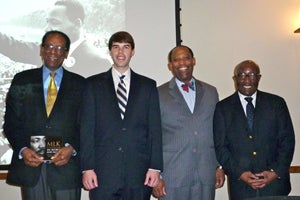Addressing a crowd gathered at Harvard Law School to celebrate the life of Martin Luther King, Jr., Allen Counter, a Harvard Medical School professor of neurology, said, “As I look out at this diverse crowd, I realize that you are Dr. King’s dream. He would be so pleased to see you like this.”
The celebration of Martin Luther King, Jr. Day at Harvard Law School on Monday, Jan. 23, featured a panel consisting of Counter and Preston Williams, a theology professor at Harvard Divinity School. Harvard Law School Clinical Professor Ronald Sullivan ’94 moderated. Students from across the University, including students from the Medical School, the Divinity School, the Kennedy School, the Business School, and Harvard College attended the celebration.
With a focus on King’s impact on the law, the conversation ranged from deep discussions of natural law to lighthearted remarks about rapper Dr. Dre. Williams brought a wealth of knowledge and academic study on the topic of King, and Counter’s anecdotes made King’s life seem vivid and immediate to the students.
Williams, who was the inaugural director of Harvard’s W.E.B. Du Bois Institute for African and African-American Research, expressed the importance of King’s courage of conviction in the face of intense adversity and compared the abuse King endured to the suffering of Jesus Christ on the cross. He said that King’s insistence upon nonviolence was a result not only of his theological background and studies of Christianity, but also his studies of Ghandi. It was this nonviolent approach that ultimately proved successful in the Civil Rights movement.
Counter, director of the Harvard Foundation, an agency to promote intercultural understanding, emphasized the importance of the nonviolent approach, pointing out that King was right to recognize that after the Civil Rights movement was over, blacks would have to live with the whites they challenged. Despite the nonviolent methods, violence still erupted from whites frightened by change. The 1963 bombing of a church in Birmingham that resulted in the death of four young girls is what really opened the eyes of the whole world to the hatred and injustice in America, said Counter.
Sullivan posed some difficult questions to the panelists, moderating them through topics including convergence theory, Vietnam, and Malcolm X. King’s “Letter from a Birmingham Jail” and Nobel Peace Prize speech, and even President Obama’s Nobel Peace Prize speech, were also discussed.
Williams’ and Counter’s message was clear: Young people need to find the courage to stand up against unjust laws. When asked about the Occupy Movement, Counter remarked that he was simply glad to see young people finally inspired and actually doing something. The principles of peace and love will help as young people try to use good means to achieve good ends, just as Martin Luther King did, he added.
The push for a celebration at Harvard Law School came about when third-year law student J. Hillyer Jennings won a T.J. Duane Community Development Grant through HL Central, a group dedicated to building community at HLS. Originally from LaGrange, Ga., Jennings started the HLS Georgia Club in his second year at HLS and found support for the event among other HLS Student Organizations, including the following co-sponsoring groups: HLS Black Law Students Association, Southern Legal Society, and HL Central. Several Atlanta-based law firms, the Harvard Club of Georgia, and the bar review course company Barbri all contributed and helped make the event possible.
